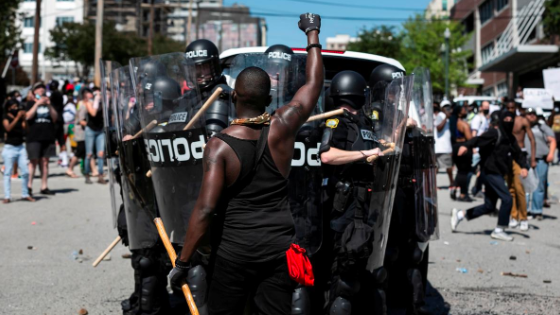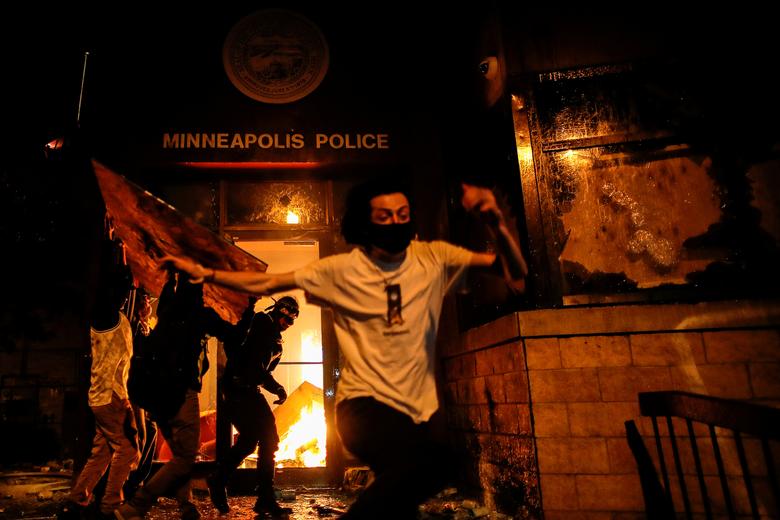
A protester confronts police officers at a rally over the death of George Floyd caused by police in Minneapolis, in Columbia, South Carolina, U.S., May 30, 2020. /Reuters
A protester confronts police officers at a rally over the death of George Floyd caused by police in Minneapolis, in Columbia, South Carolina, U.S., May 30, 2020. /Reuters
Editor's note: Stephen Ndegwa is a Nairobi-based communications consultant and international affairs columnist. The article reflects the author's views, and not necessarily those of CGTN.
Ever since the breakdown of violence as a result of the gruesome death of black American George Floyd in the hands of the police, the U.S. has been trolled from the unlikeliest of sources, including universal condemnation in the international media. Protests may be last straw for U.S. global stature, according to Reuters' latest news.
In a Tweet posted on May 31, Kenya's Foreign Affairs Principal Secretary Amb Macharia Kamau declared that were the scenes in the U.S. occurring in some other place, they would have invited severe censure from Liberal interventionists. "Democracy clearly on the back foot and civil liberties in the garbage in that blighted county."
Interestingly, U.S. embassies in African countries have also criticized their own police force for the murder, in apparent solidarity with their hosts. On May 30, thousands of German protestors chanted outside the U.S. Embassy in Berlin. Racism in Germany is a serious crime.
A couple of days ago, chairperson of the Africa Union Commission Moussa Faki Mahamat issued a statement strongly condemning the murder. Mahamat's statement was in tandem with the Organization of Africa Unity's 1964 Resolution on Racial Discrimination in the U.S., reiterating the rejection of the continuing discriminatory practices against black citizens.
Civil rights activists in the U.S. say that Floyd's incident is just a tip of the iceberg of institutionalized violence against blacks. The only difference now is that it is getting wide coverage. Moreover, the recent case happened in front of an attentive audience, with the near halting of social, economic and political activities globally due to the COVID-19 pandemic.
Analysts say there is more than meets the eye in America's long history of racial discrimination targeting blacks, and people of color to a lesser extent. Why? The vice is so systemic, deeply ingrained in the U.S.'s body politic that uprooting it would need a drastic recalibration of the American society.
Indeed, racial atrocities continued unabated during the eight-year term of the first black U.S. president Barrack Obama. During such incidents, Obama, unlike the martyred black civil rights movement activists like Martin Luther King Jr and Malcom X, deliberately avoided dwelling on racial relations under his watch.
Obama, whose father was Kenyan, shied away from showing any overt American support to his motherland, at least on account of race. It seemed that the American system did not find his ascension a threat to the status quo based on "white privilege."

Protesters set fire to the entrance of a police station as demonstrations continue in Minneapolis, May 28, 2020. /Reuters
Protesters set fire to the entrance of a police station as demonstrations continue in Minneapolis, May 28, 2020. /Reuters
Racial discrimination against blacks hurts most because they are equal partners in America's growth, having been the labour on which the superpower was built. But once the U.S. achieved superpower status, there seems to have been a deliberate attempt to relegate the descendants of slaves to the periphery.
Still, the unprecedented violence and subsequent looting of businesses by Americans of all gender and color, shows the real undercurrents in the U.S. For the non-blacks whose socio-economic plight is under par, this was a perfect opportunity to show their resentment.
But conspiracy theorists have also posited that the incident was a perfect opportunity for the country to move away from the COVID-19 daily menu, at a time when there is total confusion around re-opening of the economy.
Politically, Democratic Party likeliest presidential nominee Joe Biden can use Trump's Tweets against him for portraying gross insensitivity. While acknowledging that the death was "shocking", Trump called the thousands of protesters "thugs", threatening that "when the looting starts, the shooting starts."
Incidentally, the Floyd incident also poured cold water on one of mankind's greatest feats. Amid the violent protests, Trump attended the successful launch of the first manned spaceflight from the U.S. in almost a decade, by Space X and the National Aeronautics and Space Administration.
This time race relations in America seems to have made a paradigm shift. Perhaps it was as a result of the galling clip of the murder, with people wondering what kind of guts it took for someone to snuff out the life of a person in such a gory manner. May be it would not have drawn such global condemnation had Floyd been simply shot.
Moreover, the current implosion is yet another weakening of the foundation on which the U.S. was built. If this trend goes unchecked, it could give rise to racial war in America, a development that would have unfathomable consequences both for the U.S. and the world.
The onus also falls on the black community to change tact in their fight for acceptance, recognition and appreciation in America, by being more proactive than reactive in their quest for equality and respect. One area would be breaking the science and technology ceiling away from the stereotypical celebrity status in sports, fashion and the arts.
Going forward, the jury is still out there on the impact of this violence in America. The world is waiting to see whether there will be a spiralling of the COVID-19 curve in a second wave, following the devastating death toll in the last couple of months. Secondly, will this incident make a permanent dent in Trump's political equation during the presidential elections in November?
(If you want to contribute and have specific expertise, please contact us at opinions@cgtn.com.)